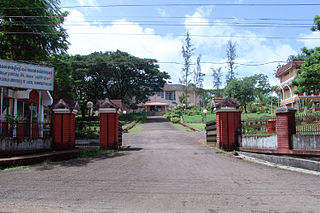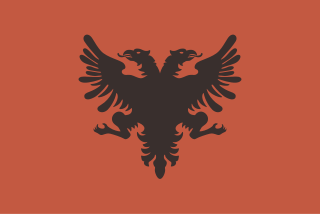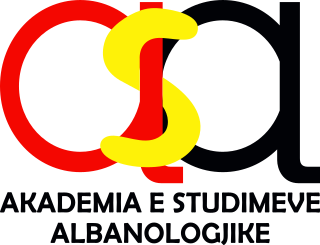Related Research Articles

Kosovo, officially the Republic of Kosovo, is a partially recognised state in Southeast Europe. It lies at the centre of the Balkans, occupying an area of 10,887 km2 (4,203 sq mi), with a population of about 1.8 million. Kosovo unilaterally declared its independence from Serbia on 17 February 2008, and has since gained diplomatic recognition as a sovereign state by 97 member states of the United Nations. It is bordered by Serbia to the north and east, North Macedonia to the southeast, Albania to the southwest, and Montenegro to the west. Most of central Kosovo is dominated by the vast plains and fields of Metohija and Kosovo. The Accursed Mountains and Šar Mountains rise in the southwest and southeast, respectively. Its capital and largest city is Pristina.

The United Nations Interim Administration Mission in Kosovo (UNMIK) is the officially mandated mission of the United Nations in Kosovo. The UNMIK describes its mandate as being to "help the United Nations Security Council achieve an overall objective, namely, to ensure conditions for a peaceful and normal life for all inhabitants of Kosovo and advance regional stability in the western Balkans."

The flag of Albania is a red flag with a silhouetted black double-headed eagle in the center. The red stands for bravery, strength, valour and bloodshed, while the double-headed eagle represents the sovereign state of Albania. The flag was established as the national flag of Albania when the country gained its independence from the Ottoman empire in 1912.
Freedom of information laws allow access by the general public to data held by national governments and, where applicable, by state and local governments. The emergence of freedom of information legislation was a response to increasing dissatisfaction with the secrecy surrounding government policy development and decision making. In recent years Access to Information Act has also been used. They establish a "right-to-know" legal process by which requests may be made for government-held information, to be received freely or at minimal cost, barring standard exceptions. Also variously referred to as open records, or sunshine laws, governments are typically bound by a duty to publish and promote openness. In many countries there are constitutional guarantees for the right of access to information, but these are usually unused if specific support legislation does not exist. Additionally, the United Nations Sustainable Development Goal 16 has a target to ensure public access to information and the protection of fundamental freedoms as a means to ensure accountable, inclusive and just institutions.

The State Intelligence Service, commonly known by its acronym SHISH, is the primary intelligence agency of Albania. It was preceded by SHIK.
The Cabinet of Ministers of Ukraine, commonly referred to as the Government of Ukraine, is the highest body of state executive power in Ukraine. As Cabinet of Ministers of the Ukrainian SSR, it was formed on 18 April 1991, by the Law of Ukrainian SSR No.980-XII. Vitold Fokin was approved as the first Prime Minister of Ukraine.

The Commonwealth of Catalonia was a deliberative assembly made up of the councillors of the four provinces of Catalonia. Promoted in its final stages of gestation by the Regionalist League of Catalonia, it was strongly endorsed by municipal referendum in October 1913.
The political status of Kosovo, also known as the Kosovo question, is the subject of a long-running political and territorial dispute between the Serbian government and the Government of Kosovo, stemming from the breakup of Yugoslavia (1991–92) and the ensuing Kosovo War (1998–99). In 1999 the administration of the province was handed on an interim basis to the United Nations under the terms of UNSCR 1244 which ended the Kosovo conflict of that year. That resolution reaffirmed the territorial integrity of Serbia over Kosovo but required the UN administration to promote the establishment of 'substantial autonomy and self-government' for Kosovo pending a 'final settlement' for negotiation between the parties.
The present Constitution of the Republic of Albania was adopted by the Parliament of Albania on 21 October 1998 and certified by presidential decree on 28 November 1998, following a failed referendum which was boycotted by the opposition. It is split up over many different acts. The document succeeded the 1976 Constitution, originally adopted at the creation of the People's Socialist Republic of Albania on 28 December 1976 and heavily amended on 29 April 1991.

The Constitution of Kosovo, refers to the supreme law of the Republic of Kosovo. Article four of the constitution establishes the rules and separate powers of the three branches of the government. The unicameral Assembly of the Republic exercises the legislative power, the executive branch led by the President and the Prime Minister which are responsible for implementing laws and the judicial system headed by the Supreme Court.
The American Council on Education (ACE) is a nonprofit 501(c)(3) U.S. higher education association established in 1918. ACE's members are the leaders of approximately 1,700 accredited, degree-granting colleges and universities and higher education-related associations, organizations, and corporations. The organization, located in Washington, DC, conducts public policy advocacy, research, and other initiatives related to key higher education issues and offers leadership development programs to its members and others in the higher education community.

Food safety in China is a concern relating to agriculture in the world's most populated country. China's principal crops are rice, corn, wheat, soybeans, and cotton in addition to apples and other fruits and vegetables. China's principal livestock products include pork, beef, dairy, and eggs. The Chinese government oversees agricultural production as well as the manufacture of food packaging, containers, chemical additives, drug production, and business regulation. In recent years, the Chinese government attempted to consolidate food safety regulation with the creation of the State Food and Drug Administration of China in 2003; officials have also been under increasing public and international pressure to solve food safety problems. Chinese Vice Premier Li Keqiang said, "Food is essential, and safety should be a top priority. Food safety is closely related to people's lives and health and economic development and social harmony," at a State Council meeting in Beijing.

The National Archives of Brazil were created in 1838 as the Imperial Public Archives. The Archives were renamed in 1911, and are located in Rio de Janeiro. The National Archives of Brazil is the Brazilian institution responsible for the management, preservation and dissemination of federal government documents. Since 2011, it is subordinated to the Ministry of Justice and Public Security.

Kerala Institute of Local Administration, abbreviated as KILA, is an autonomous training, research and consultancy organisation constituted under the Ministry of Local Self Government, Government of Kerala, registered as per Travancore – Cochin Literacy, Scientific and Charitable Societies Act-1955. KILA was established in 1990, in the pattern of a national institute, with the main objective of strengthening decentralization and local governance.
Parliamentary elections for a Constituent Assembly were held in Albania on 2 December 1945. Voters were presented with a single list from the Democratic Front, organized and led by the Communist Party of Albania. The Front won all 82 seats.

Independent Albania was a parliamentary state declared in Vlorë on 28 November 1912. Its assembly was constituted on the same day while its government and senate were established on 4 December 1912.

The Office of the Chief Archivist of Lithuania is a government agency, which participates in the shaping of national policy in the field of management and use of documents and archives, as well as implements this policy, supports the Chief Archivist of Lithuania in the carrying-out of state administration of the field of documents and archives.

The Academy of Albanological Studies is the main institution of albanology in Albania.
The Central Archive of the Armed Forces (AQFA) was created by Council of Ministers decree No. 89, dated March 21, 1964.
The Commission on the History of the October Revolution and the Russian Communist Party (Bolsheviks), also known as Ispart, was a research institute that collected, processed, archived and published history of the Communist Party of the Soviet Union and the October Revolution.
